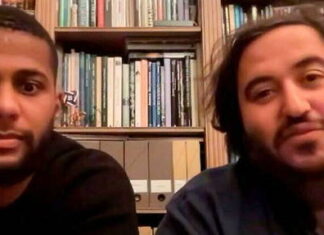What a pleasure to find Ronit Elkabetz again! His portrait has been displayed for weeks in the Paris metro – on the occasion of the release of the Black Notebooks (in theaters), the two films halfway between documentary and fiction that his brother Shlomi devotes to him. And, as when we discovered her on the screen, at the beginning of the 2000s, in a series of unforgettable films signed by her compatriots (Eran Kolirin, Keren Yedaya or Amos Gitaï) and by the tandem she formed with her brother , we say to ourselves that face has rarely been made so much for the cinema. Powerful features which, a bit like those of Maria Callas or Anna Magnani, seem to summon ancient tragedy, a haughty bearing, an electric, unpredictable presence. Disappeared in 2016 at only 51 years old after a dazzling cancer, the Israeli star has since been sorely missed by cinema and moviegoers.
It took no less than two films to bring it back to life on screen. The first is subtitled Viviane, the name of the character played by Ronit Elkabetz in the three films that she co-signed with her brother (Prendre femme, Les Sept Jours and Gett, the trial of Viviane Amsalem) and who met on their release a remarkable success (especially in France). The second is called, of course, Ronit. Shlomi Elkabetz mixes family archives, film scenes, and sequences shot for the occasion with her parents. “Black Notebooks 1 and 2: Viviane and Ronit, it’s before death, he explains to us. If there is a third episode, it will be a post-mortem. ” Meet.
Le Point: How would you sum up the impact of your family background on the life of Ronit Elkabetz?
Shlomi Elkabetz: Israel does not offer anonymity to most women. There are no big cities, apart from Tel-Aviv, and even there, we are talking about a rather small city in comparison with the big world capitals. Because of the size of the country and the weight of religion, the situation of women is particularly difficult. As for our environment, we must first describe it. It is an Arab, Moroccan family, settled in Israel in a very small town, with a very strong traditional religious structure. However, we lived in a house where the notion of freedom was strong, because, in both my parents, there was a very strong desire to be a singular individual. But, because of the importance of religion, it was impossible to escape the structure. When you grew up in it, it stays with you. Everything you do afterwards is always in reaction to the structure. I tried to show it in Black Notebooks: yes, we come from a small town in the Middle East, from a religious world where women cannot divorce, but still we ran away! Our parents gave us this freedom, they never considered us their property. We were able to leave. First in Tel-Aviv, then in Paris. That’s when we realized that the structure was following us. When Ronit came to Paris, “Viviane”, the part of her that came from this world, came with her.
“Viviane” is the heroine of the trilogy that you co-signed with your sister, she is a character strongly inspired by your mother…
In our three films, we follow Viviane Amsalem, a Jewish and Arab woman who comes from the same universe as us. She wants a divorce when there is nothing to reproach her husband for. She wants her freedom. And freedom is not something you find by running away. It only has value within the confines of its own space. Viviane could go to Tel-Aviv, of course, I’ve often been asked why she doesn’t… It would be an exile. She fights to be free in her own life, not outside it.
How have these movies affected your family relationships?
My father never saw the trilogy or maybe he did, but never said so. My mother, it hasn’t been easy. These movies don’t tell their story literally, my parents are still married, they haven’t divorced. But, in their small town, everyone thought it had to be taken literally. My dad saw the series Our Boys, where I play a straight man, a cop, religious, patriotic, taking care of his parents. He adores ! When he is complimented on my participation, he is delighted. But when we talk to him about the trilogy we did with Ronit, for example when we were nominated for the Golden Globes, he looks away and doesn’t answer. He thinks these are offensive movies for him. My parents agreed to participate in Cahiers noirs because it was an opportunity for them to have their story heard. They knew, of course, that I had the power of editing. But I had the dignity to let them express themselves freely. It’s painful, very intimate, this film about their missing daughter.
What roles do you like to see your sister Ronit in again?
The Predestined (1990) by Daniel Wachsmann. I love Ronit in it, his youth. I’m not talking about the features: she always had the same face, at 12 as at 50! But you can see an innocence in his eyes. She doesn’t know how to use her power yet. I also really like Marriage tardif (2001), where she has a very lively, very sensual role. She now knows how to put her force of expression, her eyes, her body, at the service of what she wants to tell about women, about life. And of course there’s The Band’s Visit (2007), which has so much humor, it’s a brilliant performance and a hugely successful film. And then there are also the films we made together, which remain as great moments of creativity, artistic and total sharing. Very precious memories.


















